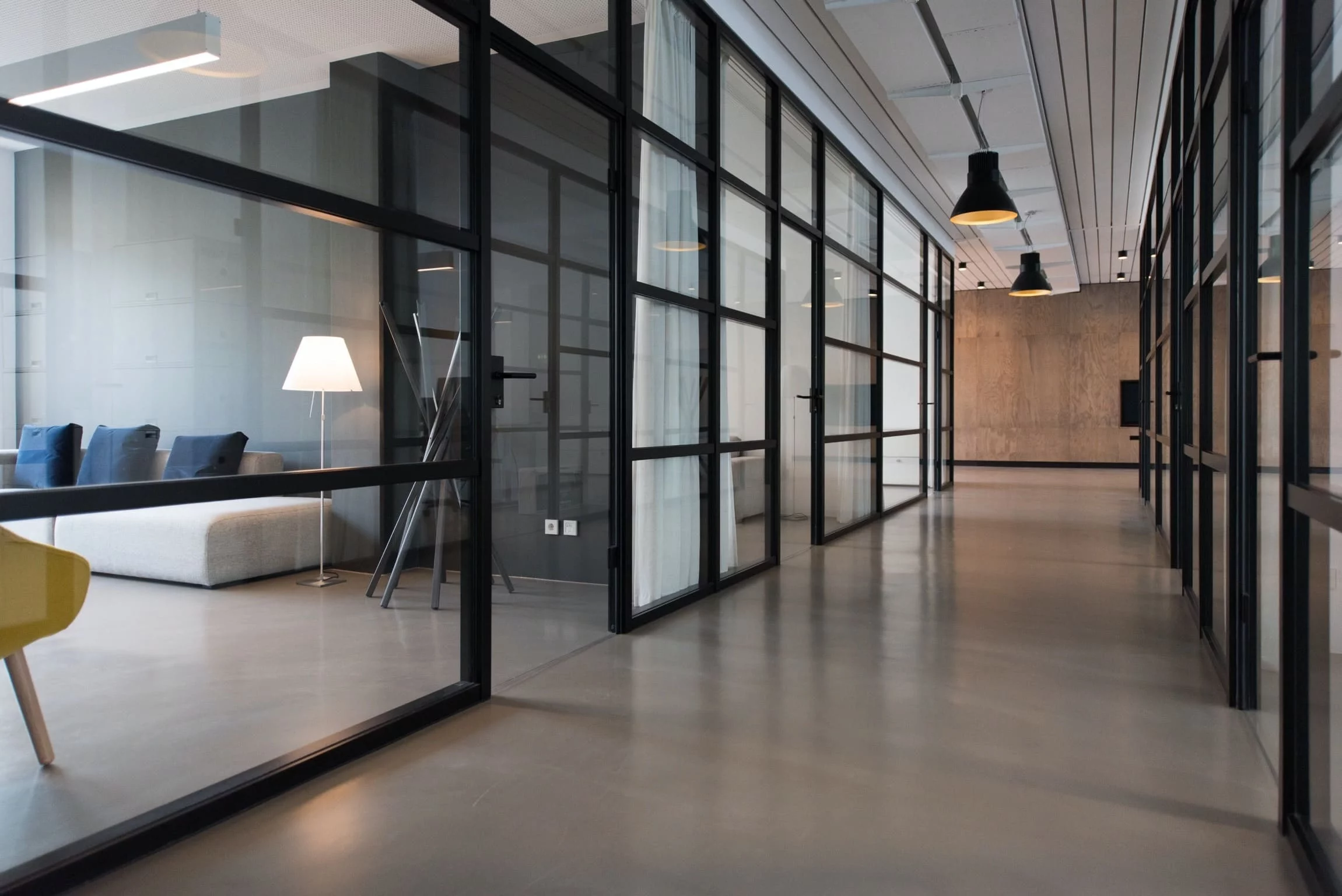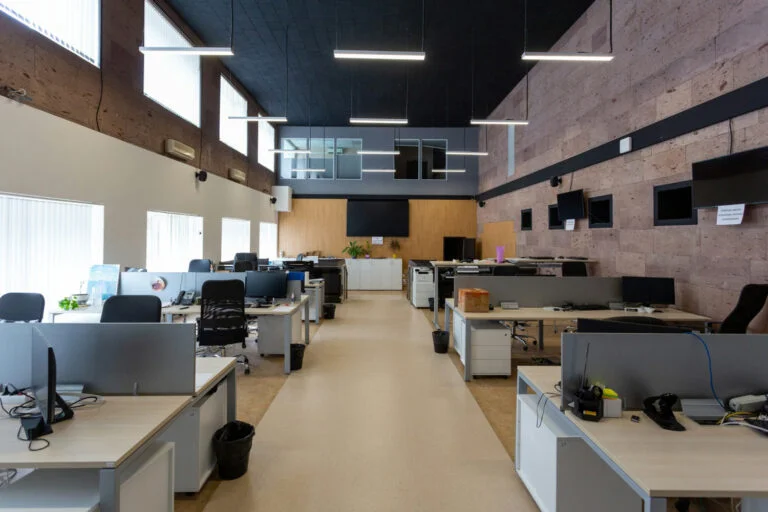Through adherence to our comprehensive space management guide, you will be able to construct a space that enhances your organizational efficiency and fosters a positive sentiment among your employees.
Space management is the art of optimizing office spaces for enhanced efficiency, productivity, and employee comfort. As companies embrace hybrid working models and prioritize collaboration-driven coworking environments, space management has evolved into a crucial aspect of modern office design. With the shift towards flexible working arrangements, businesses now recognize the importance of creating adaptable workspaces that cater to diverse work styles and foster seamless teamwork., a pioneer in flexible office solutions, understands the importance of versatility in office design. We specialize in creating custom collaboration centers that meet the unique needs of each company. Whether an organization needs a new headquarters or collaboration space, offers beautifully designed flexible workspaces to meet changing business requirements. Our comprehensive space management solution allows companies to optimize office utilization by allowing them to book office space and gain valuable insight into how employees are using the space.

In this article, we delve into the realm of space management and explore the direct benefits it provides to businesses that embrace it effectively. Before delving into its advantages, let's define the concept of space management.
Space management involves strategically utilizing office spaces to maximize efficiency, productivity, and the overall well-being of employees. This encompasses various practices, such as creating hybrid spaces that cater to different work activities and ensuring that common areas, like dining spaces and breakout rooms, are not only safe but also equipped with the necessary amenities to foster a pleasant and conducive work environment. By mastering the art of space management, companies can create a workplace that inspires creativity, encourages collaboration, and supports employees in their diverse tasks and projects.
Try UnSpot for free
Get a smart solution to manage your hybrid workplace, create work schedules, book desks and meeting rooms, schedule meetings, and get office analytics.
Optimizing Office Efficiency: The Significance of Space Management:
Effective space management is a fundamental aspect of any company's operations, regardless of its physical presence, be it a coworking space or a sprawling corporate office. By implementing good space management practices, businesses can achieve several significant advantages.
- Resource Utilization and Cost Savings:
Optimized space management allows companies to make the most of their resources, ensuring efficient use of office space and facilities. This can lead to cost savings by reducing unnecessary expenses on underutilized areas. Effective space utilization also aids in rationalizing real estate expenditures and optimizing budget allocation.
- Workplace Safety and Productivity:
Well-managed spaces promote workplace safety by ensuring compliance with safety regulations and providing sufficient room for movement and emergency exits. Furthermore, the strategic arrangement of work areas can enhance employee productivity. When employees have access to suitable spaces and tools for their tasks, their efficiency and job satisfaction increase, positively impacting overall performance.
Strategic Space Management: Enhancing Office Productivity and Success
- Focus on Flexibility:
A key principle of space management is prioritizing flexibility in office design. Create a workspace that accommodates various types of work and diverse working styles. Offer flexible seating options and utilize desk booking tools to empower employees to choose their workstations according to their preferences and tasks. Additionally, consider establishing designated zones for brainstorming, collaboration, and focused work, fostering an environment that supports productivity and creativity.
- Consider the Employee Experience:
Deliberate on how employees will interact with the physical space. Take into account their journey from entering to leaving the office. Incorporate desired conveniences such as lockers and showers to enhance their overall experience. A thoughtful approach to the employee experience can boost satisfaction, engagement, and overall well-being, contributing to a more productive and positive work environment.
- Embrace Technology:
Leverage technology to streamline the employee experience and optimize space utilization. Implement user-friendly tools for booking meeting rooms and reserving desks, making it easy for employees to plan their workday efficiently. Utilize technology to monitor occupancy levels, identifying which areas of the office are in high demand and which can be repurposed. By embracing technology, businesses can improve operational efficiency and enhance the overall workspace experience.
The Advantages of Effective Space Management
Working in a crowded, poorly managed, or inadequately designed office can be a major turn-off for employees. They crave a workspace that is not only collaborative and productive but also welcoming. Properly managing your office space is essential to encourage employees to return to the workplace and to ensure their happiness while they are there. Let's explore some other benefits of implementing effective space management.
1. Significant Cost Reduction:
For businesses, rent and office furniture expenses can become a significant burden if the space is poorly planned. Space management allows you to design an office that is the right size and furnished appropriately for your employees' needs. By reducing unused space and optimizing desk allocation, you can save on overhead costs, leading to greater financial efficiency.
2. Enhanced Productivity:
A cluttered workspace can lead to a cluttered mind. The same principle applies to the entire office. Well-managed workspaces with minimal clutter and efficient layouts enable employees to be more focused and productive. A clear and organized environment fosters a sense of order and concentration, leading to increased efficiency in tasks and projects.
3. Continuous Improvement:
One lesser-known benefit of space management is the opportunity for constant improvement. Rather than settling for a single office design, space management plans encourage you to consistently seek ways to adapt the space to fit your employees' changing needs. By utilizing office space management tools to gather data on space usage, you can identify areas for improvement and make necessary adjustments over time.
4. Greater Adaptability:
Workplace regulations and policies are subject to frequent changes. Events or circumstances may require sudden adjustments in office arrangements. A well-thought-out space management plan allows your organization to quickly adapt to these changes and remain flexible in accommodating various needs.
5. Time Savings for Workplace Administrators:
Efficient space management tools can save your team valuable time and energy. Manual desk assignments and last-minute furniture rearrangements become obsolete with improved predictability and office space planning tools. This time saved can be redirected towards enhancing the workplace experience and ensuring safety protocols are well-implemented.
6. Fostering a Thriving Company Culture:
A company's culture is shaped by the interactions and experiences within the workplace. From team bonding events to collaborative sessions and social gatherings, these interactions are essential for cultivating a connected and thriving company culture. Having a well-designed space that accommodates such activities contributes to employees feeling more engaged and connected to the company's values and mission.

Mastering Desk Space Management: The Key to an Efficient Workplace.
Desk space management is a practice that revolves around assigning desks and workstations to employees based on their individual needs and roles. This includes providing ergonomic furniture, such as standing desks or comfortable chairs, to support employees' well-being and productivity. Additionally, desk space management involves allocating workspace based on team collaboration or project demands, fostering a conducive environment for effective teamwork.
Examples of space management implementation by industry giants demonstrate the impact of these strategies:
- Google: To optimize office efficiency, Google utilizes a range of space management tools. One notable innovation is a prototype desk that automatically adjusts its height, monitor tilt, and local temperature according to the personal preferences of the employee who books it. This level of personalization enhances employee comfort and satisfaction, contributing to a more productive workforce.
- Microsoft: Embracing technology, Microsoft employs software to assign desks and monitor occupancy levels in its offices. The company also emphasizes providing collaborative team spaces that cater to both remote and in-person workers. This approach fosters seamless collaboration and accommodates the diverse needs of its workforce.
4 Essential Tools for Effective Space Management
To create an office space that perfectly aligns with your business objectives and employee requirements, you need the right set of tools. Space management software can prove invaluable in gathering data to ensure optimal space utilization and support for your employees. Additionally, such software can help you identify trends and preferences in how people utilize your workplace.
Here are four indispensable tools that will enable you to understand how your workspace is utilized:
- Employee and Visitor Sign-In System
Understanding who enters your office and how frequently is crucial for effective space planning. By knowing the patterns of your teams' presence, you can allocate appropriate spaces to meet their specific needs. A visitor management system can also help track the number of visitors to your workspace, allowing you to evaluate the comfort and efficiency of visitor check-ins and employee guidance.
- Meeting Room Booking Software
Booking the right meeting room is a common challenge faced by employees. Implementing a room booking solution allows your employees to easily find and reserve suitable meeting spaces based on their project requirements. Additionally, the analytics provided by the software can offer valuable insights into room usage and identify unused bookings that can be made available to others.
- Hot Desk Booking Software
As more companies embrace flexible seating models like hot desking and office hoteling, it becomes essential to efficiently manage desk bookings. Software for hybrid teams enables employees to view available desks and book them for their office days. Understanding employees' desk preferences and providing appropriate amenities, such as standing desks or dual monitors, can further enhance productivity.
- Space Planning Software
A space planning tool is vital for visualizing and optimizing your office layout. From simple floor planning to advanced 3D modeling, these tools, like Floorplanner and Sketchup, offer a comprehensive view of your workplace. They allow you to explore different layout options before implementing changes, facilitating better decision-making.
Overall, space management tools and strategies have become vital for modern workplaces seeking to optimize office space, promote employee well-being, and enhance productivity. As businesses continue to embrace technology-driven solutions, the future of office space management holds great potential for creating more efficient and engaging work environments.









